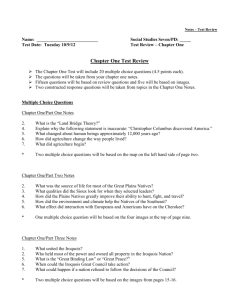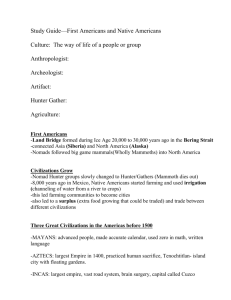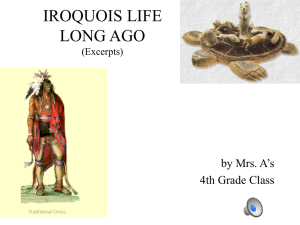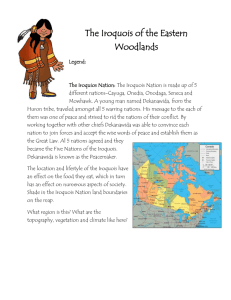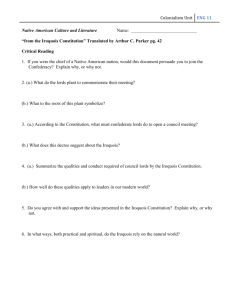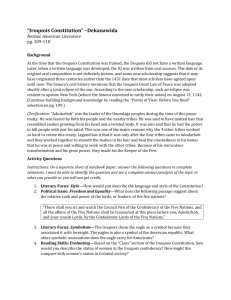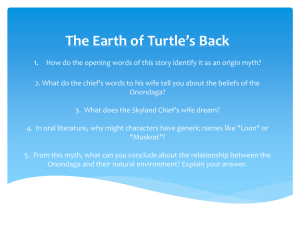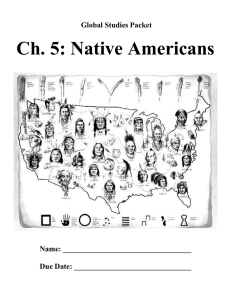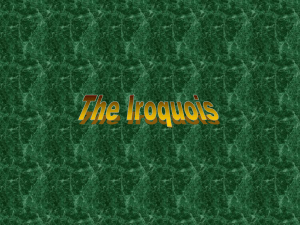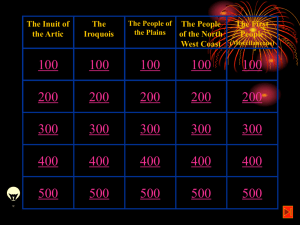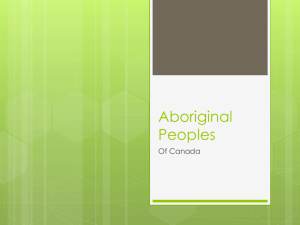Lesson 03- Pre-Contact native cultures
advertisement
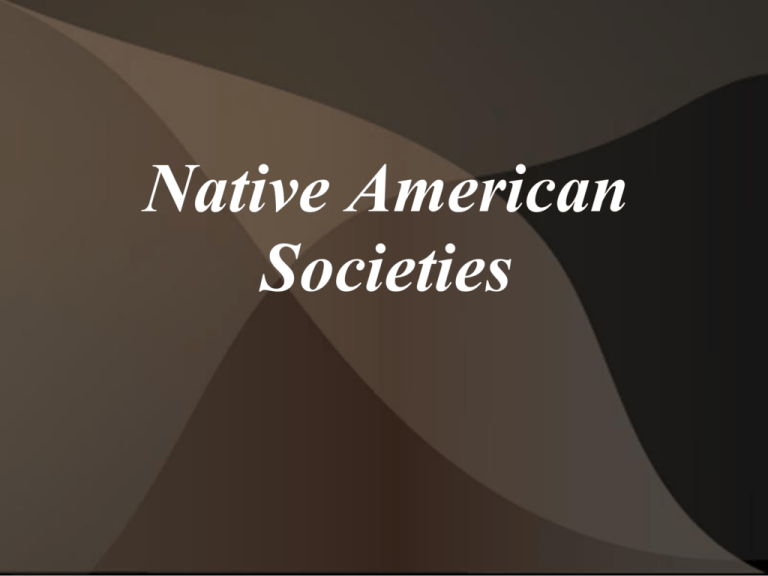
Native American Societies No one is sure how Native peoples got to the Americas Land Bridge- Maybe they crossed the gap between Siberia (Russia) and Alaska Pacific Route- Maybe they “island-hopped” from Polynesia across the Pacific Ocean Atlantic Route- Maybe they crossed the Atlantic (either via Iceland-Greenland, or Spain/Africa) Combination- Maybe it was a combination of the above Pre-Contact Societies What we know for sure is Natives got here somehow There were a great number of diverse cultures among the Native Americans Different languages Different religious practices Different lands Different lifestyles Settlement We know that the earliest Natives were here at least 13,500 years ago By 3000 years ago (1000-500 BCE) most of Canada had been settled Of course this wasn't known as “Canada” at the time, and many of the cultures stretched across the US/Canada border Each of these societies were distinct and we should not confuse them as “one group” Language Divisions Mi'kmaq Mi'kmaq Indigenous to Canada's Atlantic provinces and New England states Their territory was divided into seven different districts, each with it's own government The governments consisted of Chiefs and councils Were an Algonquin-language nation Their summers were mostly spent near the coasts fishing and gathering other types of seafood Mi'kmaq Cont... Winters were mostly spent inland hunting wild game Their main hunting weapon was the bow made from maple trees Moose was the main target for hunters They would use bows, spears and dogs to hunt moose 3-5 Men would try to lure the moose close to camp for the kill and then women would drag it back for cleaning and preparing Moose provided clothing, food, and shelter Beothuk Beothuk From Newfoundland Nomadic: followed migration of salmon, caribou and seals Harsh climate required many useful food preservation techniques (drying, smoking) Large game animals were scarce. Had to rely on smaller game Ate a lot of roots, nuts and berries Algonquin Algonquin From the Atlantic coast Not one group, but several different groups all speaking the same language. Ranged all the way across southern Ontario and down into Detroit Had a well developed canoe technology traveled through waterways of the St. Lawrence and surrounding areas traded heavily all across the continent In the winter they traveled by toboggan and snowshoes Algonquin Cont... Their semi-permanent shelters were known as wigwams these would be made of animal skins and birch bark Their society was patriarchal (men held most of the power) Shamans held a very influential role. They could heal the sick and speak with spirits Would not reveal their real names to strangers for fear of having evil spirits used against them Iroquois Iroquois The Iroquois lived near upstate New York and southern Ontario as far back as 1000 BCE. (3000 years ago) A confederacy of 5 nations. (Not one group) Warred amongst themselves for a great many years. Sometime around 1450 CE the different groups joined the Iroquois league to bring peace. Two men Deganawida and Hiawatha are credited with bringing this peace Iroquois Cont... After peace, the Iroquois became one of the great powers on the continent lived in Long Houses. (Long single-room houses for many related families to sleep) Often warred with the Algonquin Farmed Blackfoot Blackfoot Natives of Saskatchewan, Alberta and Montana areas Warrior culture Communities consisted of 10-30 lodges housing 80250 people People could leave and join other communities as they wanted This provided a great deal of flexibility Communities were large enough to defend themselves, yet small enough to maneuver Blackfoot Cont... In the winter people would stay in camps and live off of winter stores In the summer they followed the Buffalo herds The major groups would meet annually in midsummer for reunions Communal Buffalo hunts were of major significance Haida Haida From the Pacific Northwest Credited with creating the totem pole Totem poles have many meanings and uses ranging from stories, family histories and art Were excellent sailors They crafted vessels that could carry more than 60 people (made from a single redwood tree) Haida Cont... Much of their diet was seafood Used dip nets and weirs for fishing Weirs are long nets that stretch across an area of water in which fish get caught Their social structure included nobles, commoners and slaves Slaves were prisoners of war. They were always male and were always released once they completed their task. Inuit Inuit Natives of northern Canada, Alaska, and Greenland Considered a distinct culture. (Not First Nations, or Metis) Prey included whales, walrus, caribou, seal, polar bears, muskoxen, birds and fox Their diet was mostly protein and fat. This helped them survive in the harsh climate Inuit Cont... Travelled in qajaq (covered seal skin canoes) Today we have modern versions called kayaks Also used larger flat-bottomed boats called umaiq Sled dogs were also integral for overland travel Sleds would be made of wood or large animal bones (whales) Because landmarks are scarce in the Arctic the Inuit navigated using stars They would also built their own landmarks out of rocks (Inukshuk) And Many More... There were over 200 distinct Native societies before European contact This has been a brief overview of some of the major groups in Canada The main purpose was to give you an idea of how different these cultures were from one another
